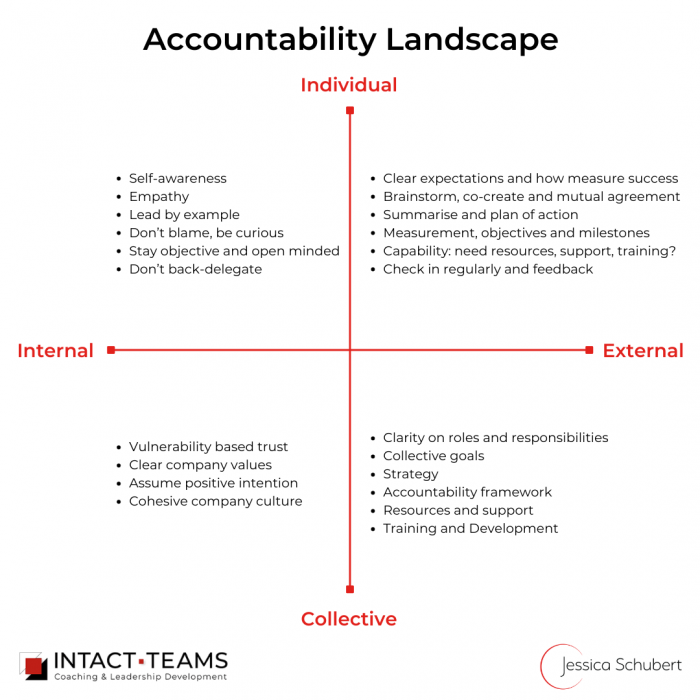Can we agree that it has been a challenging 18 months for most people? Whilst everyone experiences what is happening during this ongoing pandemic differently, one thing is clear: leaders have been called to show more compassion for their team members. Does that mean we need to ease off asking for accountability at the same time? My answer is: no.
As part of a leadership development program for a consulting firm, I am working with two leaders of an intact team, and they couldn’t have a more different approach.
One of them, Anna, an experienced project manager, shows high levels of compassion to her team members, understands their personal situations, has more 1:1 conversations and check-ins than ever before. She is very flexible with deadlines and workload. But her team is underperforming, and a couple of big projects have missed the mark. She said to me, ‘I am very understanding with my team members and am not putting any pressure on them right now, but I feel they are not pulling their weight.’ Some direct feedback from her team has revealed that they miss direction and follow-up from Anna. They feel looked after but also experience a lack of sense of urgency and follow-through.’ No wonder things don’t get done. Anna is not setting clear expectations or asking for results however that’s exactly what the team needs right now.
On the other hand, Patrick, a driven young leader, is setting very high expectations, is good at delegating tasks and holding his people accountable for their actions and results. He isn’t shy to give direct feedback and expects high performance regardless of workload and personal circumstances. His team has been performing well but they are complaining about being pushed to the brink of burnout and they miss compassion from Patrick being in extended lockdowns. One of them said, ‘It seems he doesn’t care at all that I have to home school two young children and that my workload has doubled but my time hasn’t. It’s just relentless.’ His team is performing, but they won’t be able to keep it up. A bit of compassion and support from Patrick would go a long way.
The Challenge
Compassion and Accountability are not mutually exclusive, but we need to demonstrate both with a high level of emotional intelligence.
What is Compassion?
A deep awareness of the suffering of another person coupled with the wish to alleviate it. According to Positive Psychology, there are 3 components to Compassion:
- We must feel that the troubles evoking our feelings are serious.
- We require that the sufferer’s troubles are the result of unfortunate circumstances – that is, they are not self-inflicted.
- We must be able to picture ourselves in the same predicament (Cassell, 2002).
Studies show that employees who work for organisations with high levels of consistent compassion show reduced signs of stress and more job satisfaction (Fineman, 2000). Compassion also increases engagement and loyalty.
‘Compassion is the most profitable business skill.’ – Anon
How to express compassion in the workplace:
- Look out for signs and notice clues that might suggest suffering, e.g. body language, tone of voice, unusual behaviour
- De-bias and consider that everyone can struggle. We often forget to check in with our extraverted team members
- Amplify your listening skills. Compassion doesn’t follow a give-and-take approach. Instead, it has an added component of altruism in it as the person showing compassion rarely expects to receive the same or does so to get something in return. In all its essence, compassion is “empathy in action.”
- Be supportive and stay true to your word. Offering work flexibility, reassurance around job security, empathetic listening and meaningful rituals or mementos can all help to show you understand and care.
What is Compassion?
Whilst accountability for many has the notion of sounding hard, it’s actually vital for team members to perform. There is nothing worse than being asked to perform a task or work on a project without it being followed up or recognised by the leader. In fact, accountability done right leads to higher job satisfaction.
Accountability is more than setting expectations and asking for the result with individual leaders. Accountability starts with us as leaders, and we have to consider outside factors, situations and our organisations as well. I have developed this model to show how accountability shows up in the landscape:

Check out an earlier blog where I explain the model in more detail.
‘Accountability breeds response-ability.’ – Stephen Covey
How to balance compassion and caring with accountability and high standards? Here are 6 strategies:
- Self Awareness. As with so many things, it starts with creating self-awareness. Are you a leader who feels more comfortable with compassion or with accountability? This gives you insight into which one needs more attention and energy.
- Check In. Be open with your team members and ask them what they need from you right now. Is it a bit of compassion, understanding and support to deal with working from home or getting through a rough personal situation or do they want to be challenged and hit targets? If you have built trust with them, they will tell you!
- Be Realistic. Whilst vaccines are being rolled out, many countries are opening their borders, and people are returning to the office, the situation is still tough for many, and the future is still perceived as uncertain. We need a renewed view of productivity. I hear that productivity, in general, has increased but at what cost? We need to apply a long-term strategy of compassion with accountability.
- Deal with Underperformance Directly. Don’t make assumptions that underperformance always stems from the same problem. Don’t go down the rabbit hole wondering if particular employees are using the current situation to their advantage. Find out the root cause. Is it: motivation, stress, workflow, lack of training, team dynamics etc. Go back to the accountability landscape and ask questions that enquire about all four quadrants.
- Tailored Approach. Everyone is different; everyone needs a different approach. Have regular 1:1 sessions and make it routine to ask what your team members need right now to a) feel heard and supported and b) to achieve organisational goals. Tailor your approach and communication. You probably find that everyone needs something different to feel supported yet challenged.
- Team Approach. Ask for accountability with a team approach. This way team members can support each other, feel inclusive, and it elevates team spirit. Don’t replace your 1:1’s, but if you lead a team, make it a team discussion as well.
Anna and Patrick needed different levers to change their approaches. We started with creating awareness of their mindset and their look to compassion and accountability. From there, we worked through the 6 strategies and the accountability landscape to find the right balance for them.
‘Leadership grows like tall trees. It needs both toughness and flexibility – toughness for accountability – flexibility to adapt to changes with a compassionate & caring heart for self and others.’ – Amit Ray








